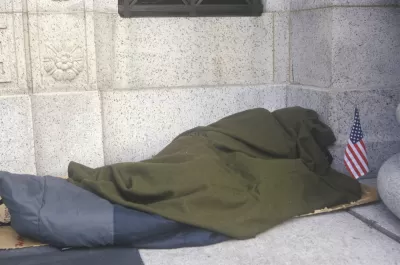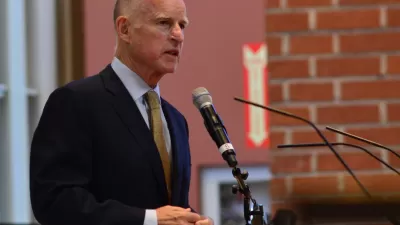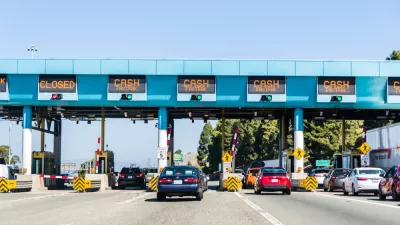The revenue bonds would be funded from a millionaires' surtax, approved by voters in 2004, to pay for health programs, but not housing, for the mentally ill. Also on ballot: a $4 billion general obligation bond measure to fund housing for veterans.

"Gov. Jerry Brown (D) authorized the ballot measure Wednesday when he signed the state’s annual budget and related legislation," reports Liam Dillon for the Los Angeles Times on June 27.
The measure would draw funding from dollars generated by Proposition 63, a 1% income tax surcharge on millionaires passed in 2004 that funds mental health services. Housing built or rehabilitated under the plan would be designated for mentally ill residents living on the streets.
The measure is aptly named the "Use Millionaire's Tax Revenue for Homelessness Prevention Housing Bonds Measure," a legislatively-referred state statute authorized by the passage of Assembly Bill 1827.
The legislature had attempted to authorize the use of $2 billion from Prop. 63 two years ago, reported Gale Holland for The Times on Jan. 4, 2016.
The new units would operate on a "housing first" model, taking in homeless people with mental illness and drug and alcohol problems even if they refuse psychiatric or substance abuse treatment, officials said.
The “No Place Like Home” initiative, Assembly Bill 1618 by Sen. Kevin De Léon (D-L.A.), passed the legislature (posted here) and was signed into law by Gov. Brown on July 1, 2016, but funding was never authorized. "[A] Sacramento attorney and mental health advocates challenged the effort in court, arguing that the money shouldn’t be diverted from treatment programs and that legislators needed a vote of the people to authorize the funds," adds Dillon.
Using the Prop. 63 revenue stream for housing may mean less funding for county programs serving the mentally ill. "Some of the $400 million in Proposition 63 money [Los Angeles County] received [in 2016] goes to housing, but it also funds a range of mental health services, including crisis intervention and transition programs for people coming out of locked psychiatric facilities," wrote Holland.
"That case is still in litigation and the November ballot measure, if successful, would free up the money," adds Dillon.
$4 billion for veterans' housing
Unlike the homelessness housing bond measure, a revenue bond measure, the California Housing Loans, Grants, and Programs and Veterans' Loans Bond, a legislatively referred bond act, has no revenue stream of its own, so it is a general obligation bond measure. The measure stems from Senate Bill 3 by Sen. Jim Beall (D-San Jose), one of a broad package of housing bills that were signed into law last year by Gov. Brown to address the state's chronic housing crisis.
FULL STORY: Californians face November decision on $2-billion spending plan for homeless housing

Planetizen Federal Action Tracker
A weekly monitor of how Trump’s orders and actions are impacting planners and planning in America.

Congressman Proposes Bill to Rename DC Metro “Trump Train”
The Make Autorail Great Again Act would withhold federal funding to the system until the Washington Metropolitan Area Transit Authority (WMATA), rebrands as the Washington Metropolitan Authority for Greater Access (WMAGA).

DARTSpace Platform Streamlines Dallas TOD Application Process
The Dallas transit agency hopes a shorter permitting timeline will boost transit-oriented development around rail stations.

Parks: Essential Community Infrastructure — and a Smart Investment
Even during times of budget constraint, continued investment in parks is critical, as they provide proven benefits to public health, safety, climate resilience, and community well-being — particularly for under-resourced communities.

Porches, Pets, and the People We Grow Old With
Neighborhood connections and animal companions matter to aging with dignity, and how we build can support them. Here’s a human-scale proposal for aging in place.

Single-Stair Design Contest Envisions Human-Scale Buildings
Single-stair building construction is having a resurgence in the United States, where, for the last several decades, zoning codes have required more than one staircase in multi-story housing developments.
Urban Design for Planners 1: Software Tools
This six-course series explores essential urban design concepts using open source software and equips planners with the tools they need to participate fully in the urban design process.
Planning for Universal Design
Learn the tools for implementing Universal Design in planning regulations.
City of Charlotte
Municipality of Princeton
City of Camden Redevelopment Agency
City of Astoria
Transportation Research & Education Center (TREC) at Portland State University
US High Speed Rail Association
City of Camden Redevelopment Agency
Municipality of Princeton (NJ)





























